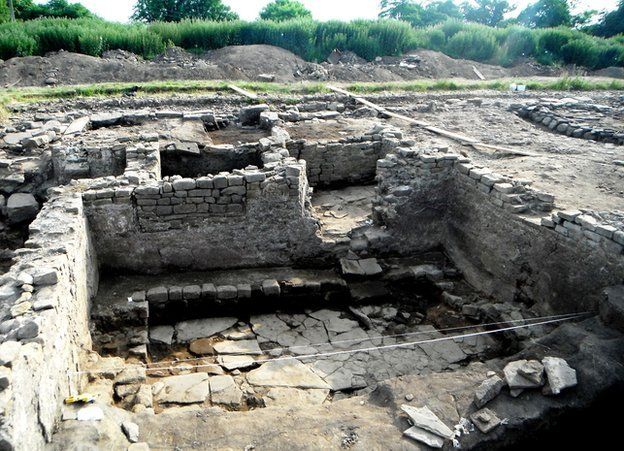Roman dig site hailed as 'Pompeii of the north'
- Published

Archaeologists excavating a Roman site in County Durham say their finding amount to "the Pompeii of the north".
The team digging at Binchester, near Bishop Auckland, has only just verified the importance of a number of their discoveries.
They include a bath house, a silver ring and an inscribed altar dedicated to a Roman goddess.
Dr David Mason, principal archeologist at Durham County Council, described the findings as "hugely significant".
He said: "They are virtually in tact and present a graphic illustration of life under the Roman Empire.
"They are so stunning and spectacular that we can claim we have our very own 'Pompeii of the north' right on our doorstep."
'Pretty exceptional'
Project co-ordinator Dr David Petts, a lecturer in archaeology at Durham University, said: "Our excavations have uncovered parts of one of the best preserved Roman buildings in Britain.
"The most unique feature of these remains is the sheer scale of their preservation.
"It is possible to walk through a series of Roman rooms with walls all above head height. This is pretty exceptional for Roman Britain."
The team said the ring, found earlier this year, is now believed to be "one of the earliest pieces of evidence for Christianity in Roman Britain".
Inscribed by a retired trooper, the altar was dedicated to the Roman goddess, Fortune the Home-bringer.
The trooper described his rank as "architectus" and the site team said it is the only example, outside Rome, which shows architects were on the staff of auxiliary cavalry units and not just the legions of the Emperor's personal protection unit.
Last year at the site, a Durham University student found an 1,800-year-old carved stone head of what is believed to be a Roman god.
Pompeii was largely destroyed in 79 AD when Mount Vesuvius erupted. Today it is a popular tourist attraction.
- Published4 July 2013
- Published4 July 2013
- Published9 September 2011